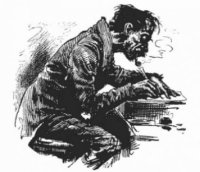Notes From a Sleepy Town

I am a true-crime and forensics aficionado. I enjoy a good mystery, and devour detective and police procedural TV shows, movies, and books. I love to follow an unfolding story, to evaluate evidence and testimony, to second-guess the investigator, and to discover the perpetrator. I find the presentation of evidence fascinating, although the TV practice of recapping after each commercial break wearies me.
There is one feature of TV crime shows, however, that I don’t like. In fact, it drives me to distraction. I call it the “sleepy town cliché.” As I settle into my recliner, the narrator sets the mood with something like this: “On a warm June night in 1989, an act of brutality fractured the tranquility of sleepy little Midville, a town where no one locks their doors at night, and where keys are routinely left in vehicles. All the comforting assumptions of the close-knit community suddenly evaporated on that summer night when unimaginable horror became incomprehensible reality. The town’s inhabitants could barely fathom the tragedy, and sleepy little Midville would never be the same.”
That’s all good if Midville is one of those hamlets that really is just a “wide spot in the road.” But no. It turns out that Midville has a population of ten thousand.
Okay. I get it. Any place with less than fifty thousand people is small when contrasted to the metropolitan communities in which most of us live. But folks, it’s not that small. Everyone in a town the size of Midville knows everyone else and trusts them? Really? I live in a “Midville,” but if I’m supposed to be on intimate terms with everyone in town, I am failing my social responsibility. Heck. I don’t even know all their names.
The other day, the front page of our daily paper featured mug shots of twenty area people arrested in a drug sweep. Would you believe that I didn’t recognize a single face? Of course, mug shots do a person about as much justice as a driver’s license photo. Still, in a “sleepy” little town like ours, you would think I’d recognize one or two of them. Not only did I not recognize any of the new celebrities; I couldn’t place a single name. I have a decent memory, but honestly, I’m incapable of remembering ten thousand names. I’m probably not even remotely familiar with more than a few hundred of them. It’s analogous to the number of my Twitter followers who might recognize my face or name. The thing is, I’m probably about as good at this recognition thing as most people in my town.
So much for the intimate town of ten thousand myth. How about that proverbial small-town trust? I’d wager that our town has the same percentage of people who engage their auto alarms as does Chicago. If we leave our doors unlocked at night, it’s probably an oversight. And leaving the keys in the car is becoming about as rare here as “double cousins” (the once common practice of a brother and sister pair marrying a sister and brother pair resulting in children who are cousins twice over).
Come to think of it, I’m pretty sure that we are less trusting than city folks. We tend to have fairly elaborate and dependable security systems: dogs outside in the yard and firearms inside the house. To judge from the caliber, fire rate, and magazine capacity, it seems that lately we are becoming quite security conscious. I attribute this domestic arms race to the same crime TV that I love. Shows like “Murder Comes to Town,” “Fear Thy Neighbor,” and “Wives With Knives” send shivers up the spine and convey a very clear message. We not only have to be wary of the suspicious-looking stranger, but also of our spouses, children, and even fellow church members. We can’t trust anyone. Maybe we ought to lock all the interior doors as well throwing the dead bolt when we go to bed at night.
A true-crime script ought to be as realistic in its portrayal of people’s reactions as it is in the description of the crime. A horrific murder in town would not make most of us Midvillians suddenly fear and suspect our neighbors. We live under a constant horror bombardment that has desensitized us as much as it has our big-city fellow citizens. Horror has to strike close to home in order to get our full attention, and that is not because we are “sleepy.” It is because it has become commonplace.
Occasionally, we, like you, may have a passing relationship with someone who is either a victim or a perpetrator of a crime. Then it becomes more personal and stays in the forefront of our minds for a while. These “personal” crimes are seldom mysteries, however. Most murders are far from fascinating. They are senseless, squalid, and banal tragedies. Like the gun violence and mass shootings that occur with depressing regularity, such crimes fail to produce the horror and outrage that they once did and still should.
In fact, our familiarity with mayhem is beginning to produce real-life imitations of made-for-television dialog. A recent murder in our town required little or no investigation since the culprit, a street person, made no attempt to get away with it. He was arrested quickly and undramatically, as most murderers are. A friend of mine who runs a liquor store near the crime scene remarked, “I hate it when that happens. Whenever someone gets killed in town, I lose two customers.”
If you live in a metropolitan area, I would guess that you have experienced the same thing as far as being “intimately related” to a victim or perpetrator as we have here in Midville. I suspect that the horrific crimes that occur near you produce similar reactions. Which brings me to one of my core beliefs: we’re all the same. In a sense, we are all small-town people. My city relatives certainly are. They live on the north side of Chicago near Wrigley Field. But you see, they don’t live in the whole city. They live in their neighborhood and frequent only a limited number of other areas within that wonderful town. They probably don’t know any more people than I do. I suspect that most city people live that kind of life.
We’ve changed in Midville. The hinterland no longer provides the insularity that small town and rural life once did. Today, it’s as impossible for us to be insulated from the wider world’s influences as it is for any of us to “live off the grid.” The line has blurred between those cultured and sophisticated urban people and us “sleepy towners.” Maybe that explains the appeal of country music among “city slickers.” (We don’t actually use that term. I think it comes from Dodge City—in the days of Wyatt Earp.)
I am not a big-city boy. I was until I was four, but that probably doesn’t count. As I told you, I have relatives in the city. Come to think of it, it’s from my Chicago cousins (single, not double) that I first became acquainted with the “sleepy town” cliché. It happened years ago when my wife and I accompanied my parents to a funeral there. My cousin’s wife, trying to make what I’m sure she meant to be polite conversation asked me about my home town. When I told her it had a population of around twenty thousand (I inflated the number to seem less of a hayseed), she asked me, quite seriously, if we had running water. I was tempted to say, “No. And you should see how crowded the creek bank is on laundry day.” Of course, I didn’t say that. That’s still too edgy for us Midville folks to say.
To be fair, we Midvillians have misconceptions of our own about the city. I think, however, we might have a better take on the urban environment than city people have on ours. The reason has nothing to do with better observation, more common sense, and certainly not superior average intelligence. It has to do rather with the fact that the vast majority of our screenplays, scripts, and books set in the city are produced by people who actually live there. It is these same folks who attempt to portray the small-town life that they are not familiar with. As any writer can tell you, the more you write what you know, the more realistic it will be.
So, barring the hiring of “small-town” consultants to get the culture and mores right, true-crime shows will continue to make me shout at the TV, “Come on, find an original way to establish the rural setting rather than repeat that sleepy town crap!”
One last thought: Anyone who is habitually sleepy is probably on something.
***
This was first published as a guest article on Nici Zaliski’s blog (Feb 3, 2017).
Go there and check it out at
https://zalliski.wordpress.com
Published on July 09, 2017 07:15
•
Tags:
cliches, reality, sleepy-town, small-town, tv-crime
No comments have been added yet.
Musings and Mutterings
Posts about my reading, my writing, and thoughts I want to share. Drop in. Hear me out. And set me straight.
- A.R. Simmons's profile
- 59 followers



